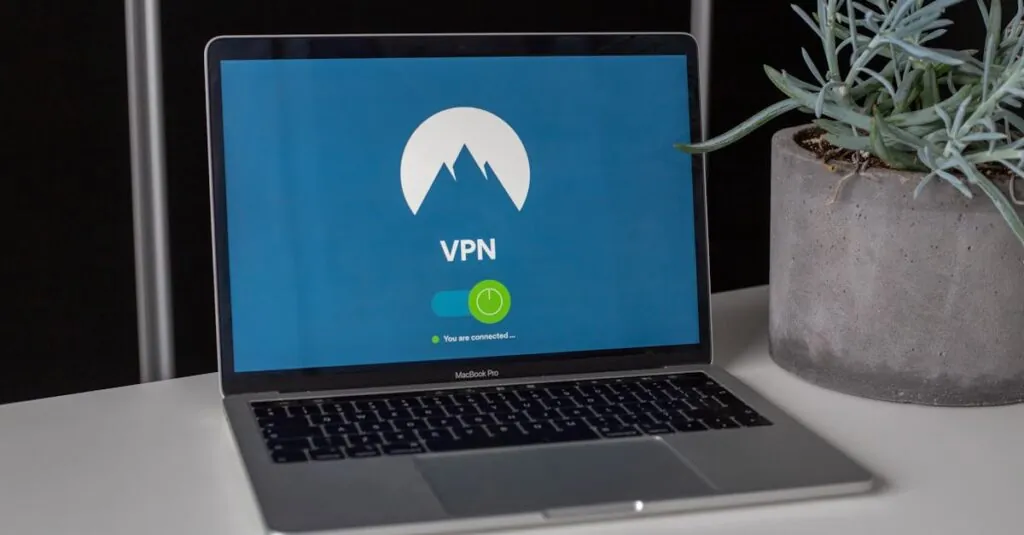Table of Contents
ToggleIn a world where cyber threats lurk behind every click, a VPN for laptops isn’t just a luxury—it’s a necessity. Picture this: you’re sipping coffee at your favorite café, blissfully unaware that hackers might be eyeing your data like a hawk. A VPN swoops in like a digital superhero, cloaking your online activities and keeping your sensitive information safe from prying eyes.
Overview of VPN for Laptops
A VPN, or Virtual Private Network, serves as a crucial safeguard for laptop users in an increasingly digital and interconnected world. Its primary function involves encrypting internet traffic, creating a secure tunnel for data transmission, and protecting users from potential cyber threats.
What is a VPN?
A VPN is a technology that allows users to connect to the internet securely through private servers. It masks the user’s IP address while enabling access to internet resources that might otherwise be restricted. By routing data traffic through an encrypted connection, it ensures that online activities remain private and secure. Users benefit from enhanced security protocols that prevent unauthorized access to personal and sensitive information.
Benefits of Using a VPN on Laptops
Using a VPN on laptops offers numerous advantages. Enhanced security measures protect against data breaches, especially on public networks. Privacy is further improved by hiding the user’s real IP address. Additionally, bypassing geographical restrictions allows access to global content, making it easier to stream shows or access services from different regions. Cost savings may occur as users find better deals on products or services available in different countries. Overall, a VPN ensures that laptop users navigate the digital landscape with confidence and security.
Choosing the Right VPN
Selecting the appropriate VPN for a laptop requires careful consideration of specific features and popular options available.
Key Features to Consider
Security features rank high on the list. Look for strong encryption protocols like OpenVPN and AES-256. Speed often influences user experience, so choosing a VPN provider with high-speed servers is essential. Compatibility is another factor; ensure the VPN supports various operating systems, including Windows, macOS, and Linux. User-friendly interfaces simplify setup and use, making an impact on overall satisfaction. Finally, evaluate customer support options; 24/7 assistance can be critical for resolving issues quickly.
Popular VPN Options for Laptops
Several reputable VPNs cater to laptop users. ExpressVPN stands out for its speed and security features. NordVPN offers advanced security options and a large server network. CyberGhost provides an intuitive interface, ideal for beginners. Surfshark allows unlimited simultaneous connections, making it suitable for multiple devices. Private Internet Access (PIA) emphasizes user privacy with a no-logs policy. Each option brings unique benefits, enhancing user experience and security while browsing.
Installation and Setup
Installing a VPN on a laptop enhances online security significantly. Following a few straightforward steps allows for quick setup.
Step-by-Step Guide to Installing a VPN
- Choose a VPN provider that suits specific needs.
- Visit the provider’s website and create an account.
- Download the VPN application compatible with the laptop’s operating system.
- Open the downloaded file to launch the installation wizard.
- Follow on-screen instructions to complete the installation process.
- Sign in using the credentials created during account setup.
- Select a server location and connect.
Completing these steps ensures users access secure browsing instantly.
Configuring VPN Settings for Optimal Performance
Adjusting VPN settings optimizes the VPN experience. Start by accessing the settings menu within the application.
- Enable the kill switch to protect data during connectivity drops.
- Choose the preferred protocol, such as OpenVPN or IKEv2, for improved security.
- Configure DNS leak protection to prevent unintentional data exposure.
- Enable auto-connect features to maintain consistent security.
- Customize the allowed apps list for split tunneling if needed.
Making these adjustments enhances privacy and speeds up connection times.
Using VPN on Different Operating Systems
Utilizing a VPN varies across operating systems, each with its unique setup and features. Knowing the specifics for Windows and Mac laptops improves the VPN experience.
VPN for Windows Laptops
Installing a VPN on Windows laptops streamlines the connection process, offering several protocols for users. Popular choices like PPTP or OpenVPN ensure robust encryption while maintaining connection speed. Users can access settings via the Control Panel or the VPN app, allowing customization based on preferred security levels. Many VPN providers offer dedicated apps for Windows, ensuring ease of use and compatibility. Connecting to a server typically involves selecting a location and clicking a button, making access straightforward.
VPN for Mac Laptops
Setting up a VPN on Mac laptops also emphasizes simplicity and effectiveness. Users can install VPN software directly from providers or utilize built-in features in macOS for manual configuration. OpenVPN and IKEv2 help enhance security on these devices, protecting sensitive data during browsing. The user-friendly interface of most apps allows seamless switching between server locations. Additionally, Mac users benefit from exclusive features like split tunneling, streamlining access to local resources while maintaining a secure connection.
Common Issues and Troubleshooting
Laptop users often encounter issues while using a VPN. Addressing these problems promptly ensures a smooth experience online.
Connection Problems
Connection problems may arise during VPN use. Users frequently experience difficulties connecting to servers, leading to frustration. Restarting the laptop or the VPN application can resolve simple connection issues. If problems persist, checking internet connectivity is essential. Verifying that the selected server is operational represents another important step. Users often benefit from switching to a different server or changing the VPN protocol within the app for improved connectivity.
Performance and Speed Issues
Performance and speed issues often affect user satisfaction with a VPN. Slow internet speeds can disrupt streaming or online gaming experiences. Adjusting the server location typically enhances speed by accessing less congested servers. Users might also consider disconnecting other devices from the network to improve bandwidth. Optimizing VPN settings can further reduce latency. Disabling unnecessary features, such as the kill switch, might also help in achieving better performance.
Conclusion
Using a VPN for laptops is essential for anyone looking to protect their online presence. It offers a secure way to browse the internet while safeguarding personal information from potential threats. With various options available users can find a VPN that fits their needs and enhances their overall online experience.
By following the installation and configuration steps outlined in the article users can maximize their VPN’s effectiveness. This ensures not only security but also improved access to global content. Embracing this technology empowers laptop users to navigate the digital world confidently and securely.




